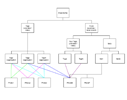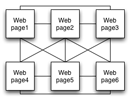the iCite net > news / blog > a permalink
news and thoughts on and around the development
of the iCite net
by Jay Fienberg
Tags stuck on trees (with pictures!)
posted: Jun 17, 2005 1:19:51 AM
One of the things that I've tried to point out about "tags" is how they are a more constrained form of relating information than what is offered by HTML links on the web (and, likewise, more constrained than the various forms of linking planned in the iCite net).
Specifically, tags are dependent on tree structures.
So, I've been at home sick all day today yesterday, and (given the mental clarity one gains when delirious with fever) I've decided to make a few diagrams that highlight how tags are dependent on tree structures, i.e., how tags function as part of (and reinforce) a stricter hierarchy than web links in general.
![]() This first diagram represents a summary of the hierarchy of Flickr in which Flickr's tags appear.
This first diagram represents a summary of the hierarchy of Flickr in which Flickr's tags appear.
(Note: All diagrams shown here click through to larger images.)
And, this second diagram represents more detail of how individuals' photos and any associated tags live within a relatively elaborate tree structure.
 The black lines all represent stricter parent-child relationships within a tree, and the colored lines represent the relational structure between tags and photos.
The black lines all represent stricter parent-child relationships within a tree, and the colored lines represent the relational structure between tags and photos.
So, the point of these diagrams is not to say that tags are trees, or to suggest that individual tags function in a strict parent-child relationship with what they link to. It's just to point out how "tags", as a whole, function in a manner that is not independent of hierarchies—they are children within relatively strict parent-child relationships of a tree structure.
So, in summary: Each system of tags lives within a tree structure. These tag systems do not work independent of the these tree structures.
 In contrast, hypertext links between web pages can be used independent of tree structures. This third diagram represents a relational network of links between web pages.
In contrast, hypertext links between web pages can be used independent of tree structures. This third diagram represents a relational network of links between web pages.
What's particularly important to recognize about this distinction between tags and hypertext links in general is how tags have a conceptual "parent", e.g., we have Flickr tags — Flickr (parent) tags (children). Links between web pages can be made without defining parent-child relationship.
Tags assert trees, rather than oppose or eliminate them. Tag systems utilize a parent context to give authority to the tags, i.e., the tags work because of their hierarchical dependence on that authoritative parent.
In a truly relational context of links, there is often no definitive parent, and there is likewise often no definitive children. With web pages, we've had and still have the means to link without trees. But, given a mostly tree-less dialect, we've actually put a lot of effort into developing tree-expressing idioms (more on this soon ;-).
***
So, I say all this because I think what's great about tags is not how they subvert hierarchies—they do so less than hypertext links in general. If you want to subvert hierarchies, think: hypertext links!
What's great about tags is how they balance hierarchy and relationship.
Flickr's tag system is great, and it's great significantly because of how the tag system utilizes the Flickr tree structure—which is also well done. Likewise, the Flickr tree structure benefits greatly from the tag system.
The lesson of tags is not the replacement of tree structures, nor the replacement of hierarchies. I think the lesson of tags is in the example of using hierarchical and relational structures in a way that brings a necessary balance between authority and independence.
permalink | comments {4} · trackbacks {1}
also available as: rss · rss2 · rdf · atom
Comments and Tracbacks
Comment by: Jay Fienberg · http://icite.net/blog/
posted: Jun 18, 2005 5:15:28 PM
I had created a Technorati diagram, but didn't include it (or any explanation about Technorati) in an effort to keep my post a little simpler.
So, I think there are a number of interesting things to imagine about these structures in Technorati (and, even too, in Flickr, del.icio.us, etc.), when you look at these sites more in terms of their role in pulling-from or being-pulled-from other sites.
But, looking at it simply, Technorati tags are part of the Technorati tree in a manner that is comparable to how Flickr tags are part of the Flickr tree.
What's tricky / different is that Technorati then uses "tag" as the single label for what are actually four nodes on the tree at two different levels:
tag1 = parent of tag2, tag3, and tag4
tag2 = blog post tag
tag3 = photo tag
tag4 = link tag
(tag2, tag3, and tag4 are siblings)
Those are all shown on a single web page on Technorati, but the conceptual distinctions and hierarchy between the four are pretty clearly indicated in the page layout.
Anyway, part of the point of Technorati tags, IMO, is getting millions of blog entries cleanly listed in the tags branch of the Technorati tree. Of course, part of what has been exciting / different is how then they get listed within that branch.
Comment by: Lucas · http://gonze.com
posted: Jun 22, 2005 7:47:30 PM
Really interesting and useful, Jay.
Comment by: Vince ·
posted: Jul 24, 2005 2:21:41 AM
In the beginning, was the tag. The attribute, the thing by which objects are grouped into ... trees.
Grouped, based at least initially on the overlap in their tag descriptions. The leaves are the points of no overlap.
Trees ought to be derivable from tags, though there will be 'noise' where an object fits into more than one tree and has tags that belong with other trees than the one you're currently compiling. As Jay observes, the same tag can be applied within different trees at different levels (presumably the height in a tree that a tag appears has a correlation with its semantics?)
So the starting point you choose when building a tree is important, and
a variety of trees could be built from the same tag-bag.
I agree that applying tags to a tree once it's grown is interesting and useful.
They can 'subvert' hierarchies by pointing to other ways to understand the same term - cross-links to the trees that may not have been built yet.
trackback from: the iCite net development blog
posted: Aug 9, 2005 1:53:12 AM
title: Overrated is overrated is overrated
Having spent way too much time on this blog yaking about tags and hierarchy (I even made diagrams!), I certainly had moments of temptation to turn Clay Shirky's "Ontology is Overrated" title against him in the way that Peter Merholz finally has.
Note: All comments and trackbacks are moderated. Spam is deleted. Other comments are approved as promptly as possible.
Note: Older posts no longer accept new comments or trackbacks.
« prev post
Aggregators not on my time
» next post
Introducing: web idioms and different webs
Comment by: Jack Vinson · http://blog.jackvinson.com
posted: Jun 18, 2005 4:05:27 PM
Interesting. How does this line of thinking work when I look at the same tag across multiple environments, such as what Technorati has been doing by combining the millions of blogs it scans? On top of that, the individual tag pages in Technorati also combine with pictures from Flickr and links from Furl and Del.icio.us?